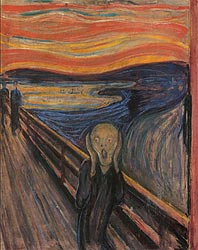SOURCE: Redeemed Reader
 |
The response was instant and furious. Book bloggers linked to the column and book aficionados zealously copied to their ListServs and friends. Librarians, teachers, and students reacted with outrage. YA authors registered their thoughts on blogs, radio interviews, and answering columns, sometimes intemperately. The controversy lapped out of book circles and spilled over onto political and cultural websites. The good news is that Meghan also received quite a bit of support, including ours. She deserves credit for bringing the general attention to a phenomenon that’s been developing for a long time with too little comment.
Now that the shouting has died down (mostly), we asked Meghan a few questions about the experience. She admits to the discovery of not enjoying being pelted with e-tomatoes, but was kind enough to share some thoughts with us:
1. What do you think was driving the overwhelmingly negative response to your first column?
 |
2. What do you see as the chief purpose of literature for young people? Or, to put it another way, what do you think young people need most from literature?
You might as well ask, what is the purpose of a garden, or a mango, or Bach! Isn’t the purpose of literature to nourish the human person? To take us worlds away, to take us deep into ourselves, to entertain and delight and stir and frighten and educate and civilize, to let us live vicariously as someone else, to participate in conversations that in life would be closed to us, to learn the literary rhythms of our culture, to feed our imaginations — these are all purposes of storytelling and story-reading. There is also a mystery to reading that deserves our respect; some hint of the otherworldly in the way a child’s face slackens when a parent is reading aloud, as if her conscious self has traveled right out of the room and into the narrative. Where does a child go, when she is reading, anyway?
3. What kind of support did you get, and what point did they most likely agree with?
There was a torrent of support that came, especially after my follow-up op-ed two weeks after Darkness Too Visible. Many kind people urged me to persist, thanked me for expressing the disquiet that they were feeling, expressed relief that someone was taking on the right-on group-think of the YA industry, etc. I heard from people who had made the mistake of complaining about books their children were given at school, and who felt immediately branded as small-minded, censorious book-banners. I heard from people who are so disgusted with the teen culture that’s being sold to adolescents that they avoid all books published after 1950! It was good, also, to hear from many thoughtful people who mainly wanted to engage with the larger cultural questions. I don’t know what single point most united them but the most common response was: Thank you. These really are live questions for families; what teenagers read and who gets to say what’s appropriate is by no means settled. Every year, a new tranche of twelve-year-olds turns thirteen. It’s forever a fresh subject, and rightly so.
4. What 3-5 children’s books (and YA) have you reviewed recently that you could recommend?
My favorite recent novels/chapter books are: “The Fingertips of Duncan Dorfman,” “When a Monster Calls,” “The Flint Heart,” “Dead End in Norvelt” and “Peter Nmble’s Fantastic Eyes.” “Wonderstruck” gets an obvious thumbs-up, too. For recent picture books, I’ve recommended “King Jack and the Dragon,”
“King Hugo’s Huge Ego,” “Blackout” and, because it makes me laugh, “Fun with Dude and Betty.”

